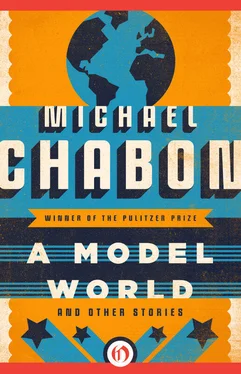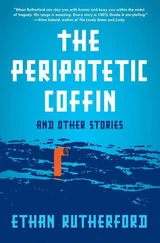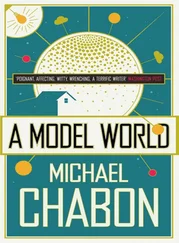Michael Chabon - A Model World And Other Stories
Здесь есть возможность читать онлайн «Michael Chabon - A Model World And Other Stories» — ознакомительный отрывок электронной книги совершенно бесплатно, а после прочтения отрывка купить полную версию. В некоторых случаях можно слушать аудио, скачать через торрент в формате fb2 и присутствует краткое содержание. Год выпуска: 2011, Издательство: Open Road Media, Жанр: Современная проза, на английском языке. Описание произведения, (предисловие) а так же отзывы посетителей доступны на портале библиотеки ЛибКат.
- Название:A Model World And Other Stories
- Автор:
- Издательство:Open Road Media
- Жанр:
- Год:2011
- ISBN:нет данных
- Рейтинг книги:5 / 5. Голосов: 1
-
Избранное:Добавить в избранное
- Отзывы:
-
Ваша оценка:
- 100
- 1
- 2
- 3
- 4
- 5
A Model World And Other Stories: краткое содержание, описание и аннотация
Предлагаем к чтению аннотацию, описание, краткое содержание или предисловие (зависит от того, что написал сам автор книги «A Model World And Other Stories»). Если вы не нашли необходимую информацию о книге — напишите в комментариях, мы постараемся отыскать её.
A Model World And Other Stories — читать онлайн ознакомительный отрывок
Ниже представлен текст книги, разбитый по страницам. Система сохранения места последней прочитанной страницы, позволяет с удобством читать онлайн бесплатно книгу «A Model World And Other Stories», без необходимости каждый раз заново искать на чём Вы остановились. Поставьте закладку, и сможете в любой момент перейти на страницу, на которой закончили чтение.
Интервал:
Закладка:
“You’re making it up,” said Mehmet Monsour, with a mysterious, Nilotic laugh. “Well done.”
“I didn’t believe it,” said Jewel. She stood up from the table and began to clear the rest of the dishes.
“Neither did I,” said Baldwin, and I suddenly found myself free of his unbearable look of kindness.
“What about me?” said Levine.
“I’m so bored!” said Monsour in a cheery voice, as though announcing his intention to take a brisk postprandial swim. He rose from the table and went back to the television.
I was surprised, as I took my leave of Monsour that evening, when he asked me to attend his next Grand Seminar, at a local ice rink, later in the month — so surprised that I consented. Monsour’s interest in me may have irked Jewel; she stopped calling. I guess she had no more real use for me, if she’d ever had any. She did not attend the seminar, and I haven’t seen her for a long time. At the ice rink, for forty-eight hours during which we imitated various animals, fasted, shrieked, and held our water, I began to learn something of the aboriginal connection between anguish and entertainment. The whole thing was a grueling and silly but nonetheless eye-opening experience, and I guess I have to credit Monsour with whatever success I have since found on the stage and even, if this deal with Lucifex Pictures goes through, on the silver screen. I’ve written a screenplay, as a vehicle for myself, based on the heroic life of Werner Heisenberg. I haven’t completely abandoned physics, you see. Of course I know what everyone says about Hollywood, and sometimes it is a little disheartening to think of making my way in a pit of savage vipers, but I have no reason not to consider myself equal to the task. As for Levine, his dissertation caused an uproar in the field after its second chapter was published in JAM . He dropped right into the tenure track at Caltech, with access to a huge laboratory and a twelve-million-dollar Cray computer, and when I went up to Pasadena the other day he told me, with a note of awe and delight in his voice, that the human race is now only a few years away, by most reckonings, from total dominion over the clouds.
Blumenthal on the Air
ANGLOPHONES OF PARIS, LADIES and gentlemen, fellow Americans in exile or on vacation or both, I have a wife; and she has her green card. We live beside the most beautiful cemetery in the world. When we walk along the quiet streets of Père-Lachaise, climb all the staircases to its highest tombs, stand before the small stone palace that holds the bones of a Russian princess, sometimes Roksana talks sweetly and kisses me on my ear or fingertip, and for a second we’ll seem married and almost normal. But in any other part of Paris, and in several parts of the United States, I am merely the man who is making her a citizen, and she will hardly look my way. Roksana is Iranian — or Persian, as she prefers to say — big and black-haired; her lips and lashes are thick and dark; she can beat me up. She is the most beautiful woman I’ve ever known, but when she’s angry or seized by Persian lust, something enters her face and she gets to looking savage, ancient, one quarter ape. I was playing records in Dallas, working for an FM station far down on the left-hand side of your radio dial, hanging around with the kind of people who have imperiled foreigners as friends, when I heard that an Iranian woman of iron will and countenance was looking for a husband. I met her at a party, watched her drink a whiskey, and, as Roksana spoke unwillingly of her battles, old and new, with secret police and landlords, zealots and bureaucrats, spoke of the loss of her father, of the terrible tedium of homelessness in a tone neither self-pitying nor angry, I admired her. Initially, it was only that — a marriage of admiration and desperation, made for neither money nor love. Under the gaze of the I.N.S., the love police, we planned to live together, intimately perhaps, for the three years it would take her to become a citizen, divorce, and afterward maintain nothing more than a strange, inexplicable friendship. Had I not breached our contract by actually falling in love, we would still be in Texas, counting the days, but here we are, in the capital of France, waiting for her heart, or mine, to undertake a change.
So now, every Saturday from eight to midnight I play records here on La Voix du Brouillard, and talk about Los Angeles in school French, because certain Parisians are crazy for L.A., where my brother, Calvin, is an Artists and Repertoire man for Capitol Records. Once a week he sends me an account of his previous seven days of living on the edge, of parties, of massive car accidents, of billiard-ball trysts with models and waitresses, knocking into them and then spinning off into some other corner of the city. I translate his letters and read them over the air, in a Rod Serling voice (tricky in French). I have fans; girls call me up and, on the air, promise me rendezvous and the round parts of their bodies, and so on. Guys call to request songs, to tell me about their pilgrimages to southern California in 1969 or 1979, the wild blondes they met there, le délire californien , and so on.
Tonight Roksana calls after I play a song for her. She says thank you, very politely, and we don’t chat. I picture her sitting at the table with the radio and the telephone, in her men’s underwear, eating a plate of boiled meat or a five-ton slab of some Iranian dessert, listening to the sound of my voice speaking in a language she doesn’t know. When I picture this, I am filled with love and hopelessness. Paris seemed like a good idea when I was hopeless in New York, the way New York did when I was hopeless in Dallas, but it hasn’t worked even the slightest charm, and Roksana’s tremendous heart slumbers on. I do not even have her thanks. “You should have charged me,” she has said, twice. “I would have paid.”
After she hangs up, I put on “Sister Ray,” because it’s seventeen minutes long, and I go to stand in the street outside the studio and smoke three cigarettes end to end. No one else is in the little studio at this hour, and the thought of the stylus drawing nearer and nearer to the emptiness after the last groove of the song, without me there to make the segue, thrills me and keeps me from thinking about everything else. And then when I am thrilled enough, I drop the third cigarette and rush back into the studio, with the stumbling, happy urgency of someone who has heard the milk on the stove begin to boil over. I play this game pretty often. Sometimes I make it, sometimes there’s a terrible pause.
At midnight I shake hands with Jean-Marc, le Jazz-Maniac, who’s on his way in for his shift. Then I’m out and I echo along the street to the Metro and clatter down onto the empty platform. At the foot of an advertisement for a new American film, someone has scrawled a tangle of Farsi, a long, descending statement followed by three tiny exclamation points, and it looks to me like the notation for a difficult passage of music, a decrescendo. I catch the next-to-last train home and ride alone in the fluorescence the whole slow way. I’ve read all the advertisements, all the safety warnings and every damn word of French between the Europe and the Père-Lachaise stations a hundred times, and now reading them again makes me jumpy, impatient. I’m in a hurry because it’s late and we still have to pack for our trip to Brittany tomorrow. And when I get home, Roksana’s stretched out on the sofa with her eyes wide open and the two suitcases are lying empty on the living-room floor.
“Roksana,” I say, “I saw some Persian graffiti in the Metro again tonight.”
“I didn’t write it,” she says.
“Come on, let’s talk. Tell me some more about Iran.”
Читать дальшеИнтервал:
Закладка:
Похожие книги на «A Model World And Other Stories»
Представляем Вашему вниманию похожие книги на «A Model World And Other Stories» списком для выбора. Мы отобрали схожую по названию и смыслу литературу в надежде предоставить читателям больше вариантов отыскать новые, интересные, ещё непрочитанные произведения.
Обсуждение, отзывы о книге «A Model World And Other Stories» и просто собственные мнения читателей. Оставьте ваши комментарии, напишите, что Вы думаете о произведении, его смысле или главных героях. Укажите что конкретно понравилось, а что нет, и почему Вы так считаете.












